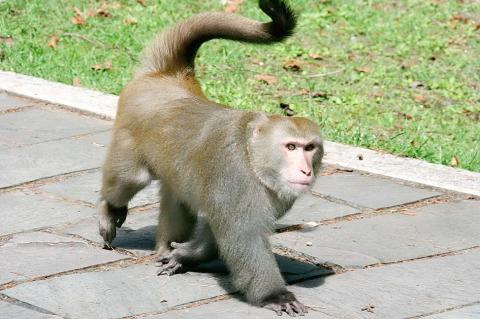Three aggressive macaques that attacked 10 visitors to Yushan National Park over the weekend were captured and sent to the Department of Agriculture on Monday to be placed under observation for possible rabies infection, the Centers for Disease Control (CDC) said yesterday.
The three macaques — a female and two males — reportedly attacked a total of 10 visitors in the park’s Tataka Recreation Ground on Saturday and Sunday.
The centers reported that eight of the 10 visitors who were bitten by the macaques have since received rabies vaccine, while two had declined to be vaccinated.

Photo: courtesy of the Yushan National Park Administrative Office
All of the injured visitors will continue to be monitored, the centers added.
Chen Chen-chih (陳貞志), a researcher at National Pingtung University’s Institute of Wildlife Conservation, who assisted in the capture of the animals, said the macaques so far have not displayed any symptoms that would indicate that they have rabies.
“However, since they are wild animals and have attacked people, they have to be put under quarantined observation for at least 10 days,” he said.
While the three need to be further tested and observed to determine whether they have been infected with rabies, it was found that the captured female exhibited symptoms of herpes B virus infection such as blisters in its mouth.
The 10 injured people have been advised by the centers to receive anti-herpes drugs if deemed necessary by a clinical physician.
The centers said that herpes B virus infects a broad range of mammals including monkeys and humans, and can damage the central nervous system.
Human infections with the virus are mostly caused by scratches or bites from infected monkeys, the centers said, adding that symptoms include acute fever, headache, skin lesions and neurological symptoms.
Reported cases of herpes B virus infection in humans are extremely rare.
There have been 40 reported cases of herpes B infection in humans globally, the centers said, adding that infection of the virus in humans can be fatal, as the mortality rate is above 70 percent if the infected person fails to receive proper treatment.
The centers said that the best infection prevention strategy is to avoid being close to, playing with or feeding monkeys.

Eight restaurants in Taiwan yesterday secured a one-star rating from the Michelin Guide Taiwan for the first time, while three one-star restaurants from last year’s edition were promoted to two stars. Forty-three restaurants were awarded one star this year, including 34 in Taipei, five in Taichung and four in Kaohsiung. Hosu (好嶼), Chuan Ya (川雅), Sushi Kajin (鮨嘉仁), aMaze (心宴), La Vie by Thomas Buhner, Yuan Yi (元一) and Frassi in Taipei and Front House (方蒔) in Kaohsiung received a one-star rating for the first time. Hosu is known for innovative Taiwanese dishes, while Chuan Ya serves Sichuan cuisine and aMaze specializes

STATS: Taiwan’s average life expectancy of 80.77 years was lower than that of Japan, Singapore and South Korea, but higher than in China, Malaysia and Indonesia Taiwan’s average life expectancy last year increased to 80.77 years, but was still not back to its pre-COVID-19 pandemic peak of 81.32 years in 2020, the Ministry of the Interior said yesterday. The average life expectancy last year increased the 0.54 years from 2023, the ministry said in a statement. For men and women, the average life expectancy last year was 77.42 years and 84.30 years respectively, up 0.48 years and 0.56 years from the previous year. Taiwan’s average life expectancy peaked at 81.32 years in 2020, as the nation was relatively unaffected by the pandemic that year. The metric

Taiwan High Speed Rail Corp. (THSRC) plans to ease strained capacity during peak hours by introducing new fare rules restricting passengers traveling without reserved seats in 2026, company Chairman Shih Che (史哲) said Wednesday. THSRC needs to tackle its capacity issue because there have been several occasions where passengers holding tickets with reserved seats did not make it onto their train in stations packed with individuals traveling without a reserved seat, Shih told reporters in a joint interview in Taipei. Non-reserved seats allow travelers maximum flexibility, but it has led to issues relating to quality of service and safety concerns, especially during

A magnitude 5.1 earthquake struck Chiayi County at 4:37pm today, the Central Weather Administration (CWA) said. The hypocenter was 36.3km southeast of Chiayi County Hall at a depth of 10.4km, CWA data showed. There were no immediate reports of damage resulting from the quake. The intensity of the quake, which gauges the actual effect of a seismic event, measured 4 in Chiayi County, Tainan and Kaohsiung on Taiwan's seven-tier intensity scale, the data showed. The quake had an intensity of 3 in Chiayi City and Yunlin County, while it was measured as 2 in Pingtung, Taitung, Hualien, Changhua, Nantou and Penghu counties, the data